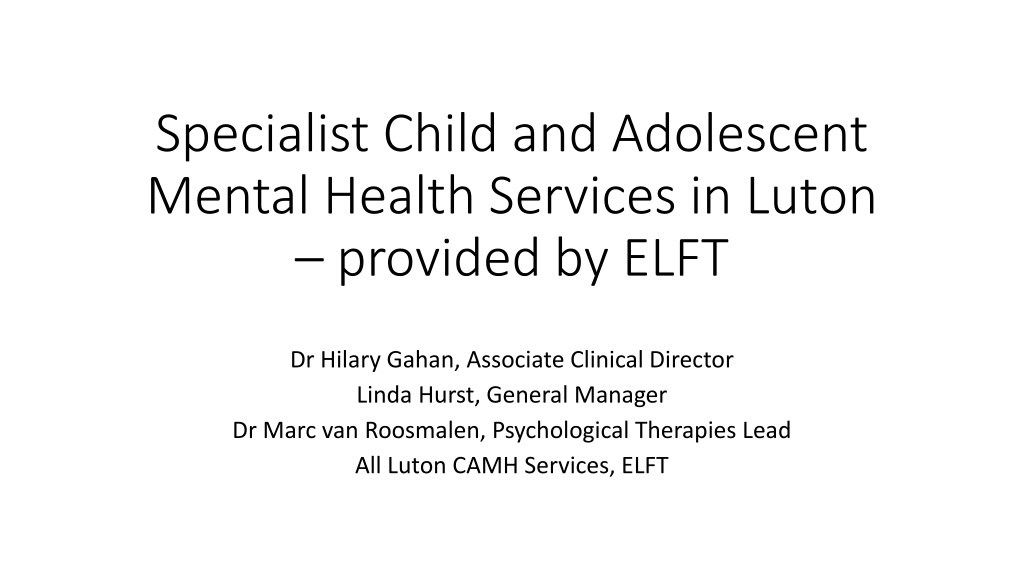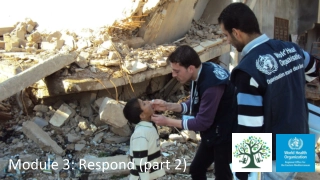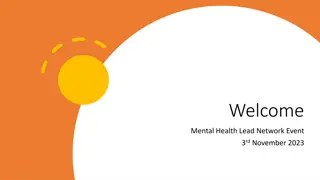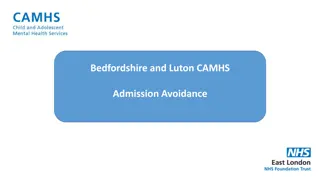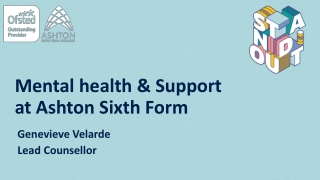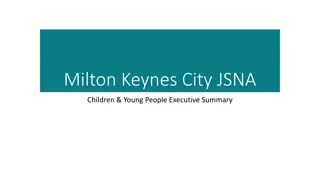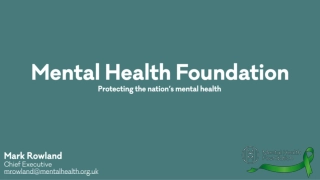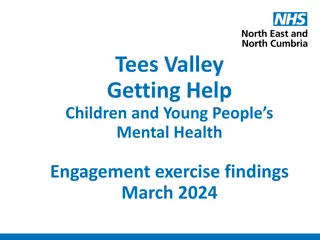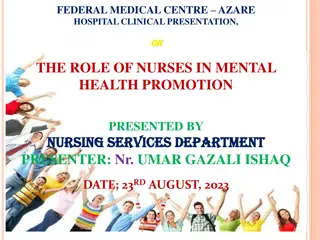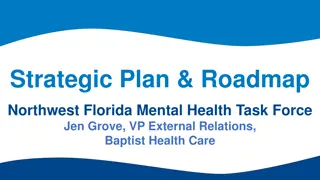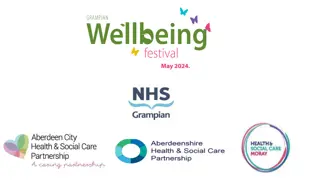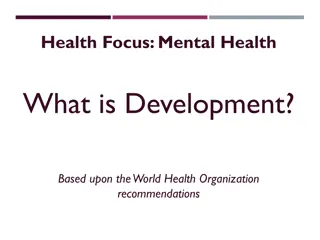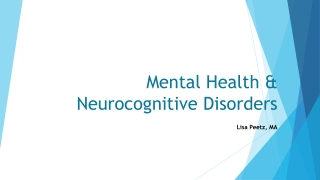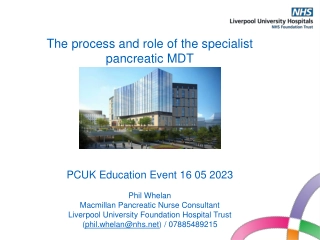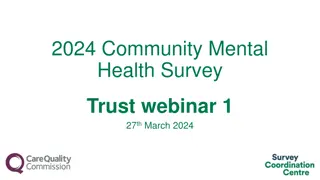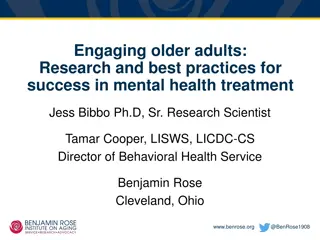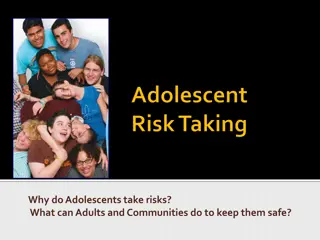Specialist Child and Adolescent Mental Health Services in Luton by ELFT
ELFT provides Specialist Child and Adolescent Mental Health Services in Luton, offering a range of interventions and support for young individuals with mental health needs. Services include primary prevention training, consultation in schools, and a digital offer for accessible help. iThrive services model a needs-based approach with a focus on resilience and community co-production.
Download Presentation
Please find below an Image/Link to download the presentation.
The content on the website is provided AS IS for your information and personal use only. It may not be sold, licensed, or shared on other websites without obtaining consent from the author. Download presentation by click this link. If you encounter any issues during the download, it is possible that the publisher has removed the file from their server.
Presentation Transcript
Specialist Child and Adolescent Mental Health Services in Luton provided by ELFT Dr Hilary Gahan, Associate Clinical Director Linda Hurst, General Manager Dr Marc van Roosmalen, Psychological Therapies Lead All Luton CAMH Services, ELFT
National National iThrive Services model Services model iThrive CAMH CAMH Needs-based service offer Episodes of care Integrated MH offer Common language EI+P resilience based approach, including whole community resilience co-production
iThrive iThrive Getting Advice Getting Advice Primary/universal prevention training, psycho-education, coffee mornings, drop-ins, assemblies, parents evenings, community engagement and co-production initiatives, . Secondary prevention consultation in schools, GP practices, FPS, reflective practice/case discussion groups, training for particular groups/parents/children, signposting GA not only based on individual, but on schools/communities resilience building 3
Getting Advice locally Getting Advice locally Community Voluntary Sector Single Point of Entry SPOE self referral Clinician of the Day Integrated Schools Offer: Mental Health Support Team (MHST) Schools Mental Health Team (SMHT) CSLT Primary Care Access Service (PCAS) CHUMS Family Wellbeing Team Early Help/FPS 4
Getting Advice locally Getting Advice locally Digital Offer Local Offer/ CHUMS / Lumi Nova / Chat Health / Kooth / Alumina / Apps CAMHS Integrated Schools Offer and PCAS Alumina CBT DSH course Self Help resource packs Social Prescribing- Active Luton Co-produced training offer Gender Identity / Parent Psycho Education Discovery College (DiSCO) 5
iThrive iThrive: Getting Help : Getting Help Children, young people and families who need specific interventions relating to their mental health need. This group includes those who would benefit from evidence-based help and support with clear aims and agreed criteria for assessing if these aims have been achieved. Mild to moderate mental health problems that require a brief episode of support Depending on the needs of the young person, this therapeutic support can be offered by different agencies.
Getting Help Locally: CAMH Access Services Two Mental Health in Schools Teams One Camhs Schools Liaison Team A third MHST coming on stream in September 2023 A Primary Care Access Team working in GP practices Provide early intervention for mild to moderate mental health and emotional wellbeing issues Supporting staff within a school or college or GP setting to provide a whole school/primary care approach to mental health and wellbeing Act as a link with local children and young people s mental health services Focussed in area s of deprivation, where children s emotional wellbeing is impacting on there opportunities to learn and achieve- reducing inequalities Integrating with existing mental health schools provision to provide a comprehensive offer 7
iThrive iThrive: Getting More Help : Getting More Help Children, young people and families who need more extensive and specialised interventions and support relating to their mental health needs. These children and families often require multi-disciplinary support, which may be medium term in length and moderate to severe in the severity of their difficulties. This group includes those who would benefit from evidence-based help and support with clear aims and agreed criteria for assessing whether these aims have been achieved. The input from CAMHS might be more extensive with specialist treatment, including inpatient admissions if required.
Getting More Help Locally Getting More Help Locally 2 Emotional and Behavioural teams (moderate to severe MH) Adolescent Mental Health team (severe mental health issues for young people where risk a strong feature) Neuro-Developmental Team County wide Eating Disorders Team County Wide Children Looked After Team (now also covering Luton)
iTHrive iTHrive: Getting Risk Support : Getting Risk Support Children, young people and families who have not benefitted from or are unable to use help, but are of such a risk that they still need contact with services. The group includes those who have already been offered extensive input with limited therapeutic progress. The input from CAMHS will be risk management, crisis response and supporting the network Clear crisis pathways into CAMHS, including A+E presentations, calling 111 and self-referrals Crisis huddles in partnership with system Diversion from A&E Rapid escalation into services Community / creative engagement
Quality Improvement (QI) lens Quality Improvement (QI) lens Improving mental health equalities in the south neighbourhood Improving mental health equalities in the south neighbourhood a quality improvement programme through MHST a quality improvement programme through MHST What is a triple aim project: - improve patient/family/client experience - improve population health - improve value for money Understand the needs and assets of children, young people and their families in the community Three part data review: - review available data - engagement with teams/services/agencies providing care - service user and citizen views/engagement with - understand their views and perspectives
Why QI? Why QI? Significant increase in demand, complexity and acuity of need, is not tailing off following pandemic. Cannot only respond by doing more of the same an overwhelmed system NHS, nationally Working preventatively at primary and secondary levels in the community strengthen and empower communities, not just to be the subject of interventions/support To embed a relational and resilience based model in the communities of Luton, that is trauma-informed - will destigmatise and normalise mental well-being Take into account the social determinants of mental health
How to strengthen resilience.. How to strengthen resilience.. Strengthen social relationships and community connections for CYP and families Enable and build social capital, social networks and social support within and between communities Strengthen and/or repair relationships between communities and health and social care agencies, eg enhancing community control by co-production Improve the quality of the social relationships of care between CYP and families and professionals (Friedli and Carlin, 2009, substantiated by subsequent longitudinal studies)
Aims of QI project: Aims of QI project: Co-producing the focus and delivery for MHST W5 with the community An asset based and resilience focused approach Empowering communities, increasing social capital A relational, resilience and social model of mental health Integrated early intervention and prevention through community venues family hubs? A collaborative of meeting mental health, including the social determinants of mental health
Co Production Strategy Co Production Strategy Integral to everything we do Dedicated team of experts by experience young people / parents Service Development Chameleon Newsletter Parent / Carer groups Recruitment Training Film / promotions / Breaking the Stigma / podcasts Better Days Campaign
Transition Strategy Transition Strategy Clear Process to review cases Embedded Transition Support Workers enhance experience Trust Strategic Lead appointed Local transition audits with adult partners Refreshed Transition Policy and shared across LAs Local Transformation workshops series on ongoing events
Service Challenges Service Challenges Demand Mapping demand across the system Pressure on partner agencies External expectations Increasing access BLMK Deep Dive recommendations Recruitment Non recurrent funding
Service Achievements Service Achievements Expansion of MHST An integrated approach Multi-agency CAMH integration A SEND Lead priority area Workforce development, greater skills mix, clinical leadership and project management Co-production / People participation Community Resilience Model Expansion of Discovery College County Wide Children Looked After Team expanding to cover Luton Dialectic Behavioural Therapy (DBT) Tier 4 Offer SPOE mapping demand workshops QI projects
Next steps for CAMHS Next steps for CAMHS Triple Aims QI Stakeholder event 9 March at Hampton Hilton 9.30 -14.00hrs Continued partnership opportunities with LBC Child Friendly Town Ambition / Better Days Campaign/ Residential Provision Opening of Evergreen Widening PP audience to capture voice of all NDD pathway development across BLMK SPOE Workshops mapping demand
Thank you for listening, happy to take any questions?
